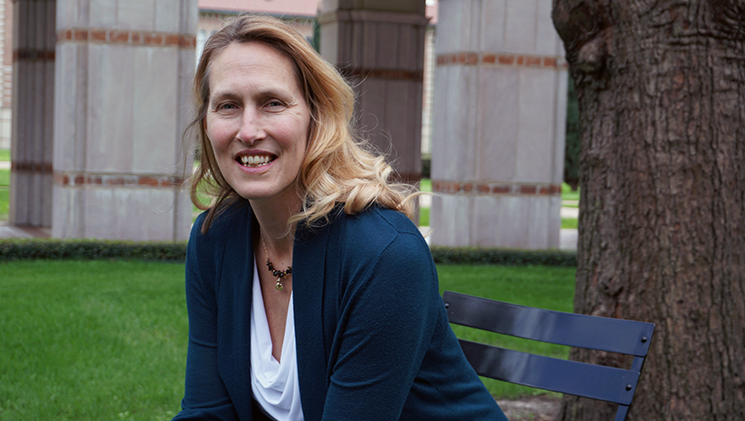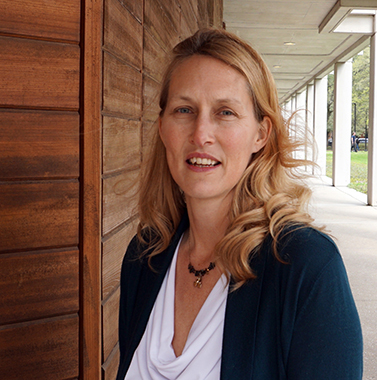 From leading wilderness excursions, to developing ecommerce websites, to teaching college mathematics courses, Becky Liston Carter (MCS ’94) has charted a career course that allows her to indulge in the activities she loves most.
From leading wilderness excursions, to developing ecommerce websites, to teaching college mathematics courses, Becky Liston Carter (MCS ’94) has charted a career course that allows her to indulge in the activities she loves most.
She started out as a high school teacher and summer camp guide. Carter said, “After majoring in Math, with minors in Physics and Education at Principia College, I was working in a summer camp and leading remote excursions where I was away from base camp. At the end of one excursion, I found I had been offered a job as a small town high school math teacher, and I took it.”
Carter was successful as a teacher, but kept remembering how much she’d enjoyed the computer science courses she’d taken as an undergraduate. So she wrapped up her first teaching job and headed to Rice University for a professional master’s in computer science degree.
“One of the first Rice classes I took was COMP 310 with Keith Cooper. I needed to get up to speed on my coding since I didn’t have a CS background,” she said. The course introduced her to programming as well as developing projects in a team.
“I thoroughly enjoyed working with so many different teams. The first project had us work in teams of three or four students to build a word processor. One person was focused on the data entry side, one worked on output, and one built the storage framework.
“Each team in the class was creating a word processor, testing, and turning it in. The next week, we were assigned to different teams to create a different project. That course was valuable to me because I learned how various people developed software, including their design, implementation, and communication styles. And of course, I was learning C++ at the same time,” she said.
The course also introduced students to the process of testing, and learning to determine what made for rigorous tests. The rapid design-test-implement environment later helped Carter during job interviews. She said every interviewer asked about her experience developing software in a team, and that first course provided multiple examples.
 Carter continued spending her summers as a camp director, which also helped in her later interviews. She said, “I was leading outdoor wilderness expeditions through caves and down rivers and learning general business skills–including hiring and firing employees–in my role as the director. So I was bringing quite a bit of business background to the table, having run a staff of 50 or more.”
Carter continued spending her summers as a camp director, which also helped in her later interviews. She said, “I was leading outdoor wilderness expeditions through caves and down rivers and learning general business skills–including hiring and firing employees–in my role as the director. So I was bringing quite a bit of business background to the table, having run a staff of 50 or more.”
As she moved through various industry roles, Carter found her niche between the information technology (IT) staff and company executives.
“The IT people would tell me what they thought was important. The executives didn’t care about process unless it affected the bottom line. But I could link system issues to glitches that impacted the bottom line,” she said.
“I could show they were ‘losing x dollars from a particular line due to this system issue that you’ve been pushing under the rug every time the programmers bring it up. It will save you millions of dollars if you’ll just solve it now.’ And that is how I was able to get several IT projects authorized and completed – because I was the first person who could convey their importance from the corporate perspective.”
Feeling satisfied with her industry accomplishments, Carter changed directions and became an active volunteer in non-profits, and community and government action groups while raising a family. Along the way, she began developing web and ecommerce sites for those same organizations. Carter said after a decade of volunteer work and side projects, she planned to jump back into a fulltime software development position.
“I expected to turn web development and ecommerce into a full time offer. Then I got sidetracked in academia,” she said.
 Carter heard a neighbor who worked as a speech professor in the Austin Community College system talk about the benefits of being a professor where you could define your hours semester by semester.
Carter heard a neighbor who worked as a speech professor in the Austin Community College system talk about the benefits of being a professor where you could define your hours semester by semester.
She said, “When I heard I could pick when I wanted to teach and ACC would put me in a course and campus around those hours, I decided to apply. Then I found how delightful it is: I have a great work life balance and work on a beautiful campus. And it is inspiring to see the impact I’m making on my students.”
Her courses often take her to a different ACC campus each semester, and the diversity of her students also changes by location. Carter said, “I’ll get some students who’ve had a rough go of life on some of the campuses. One young guy had never seen algebra in his life, but he was a fantastic logical thinker and student. The circumstances that may have taken him through prison–or whatever– didn’t affect his ability to program.”
ACC will soon be introducing a new program called Mechatronics Engineering Technology (MechTech), teaching students to design, implement, and repair technology-based systems.
“The MechTech program is just so usable and beneficial to our country,” said Carter. “I teach pre-req classes for that and other programs. Math is math.”
She advises students to find an industry that matches their interests. At one point in her career, she was working on biotechnology applications when an important cancer cure was made literally across the street from her office. But Carter said she had to force herself to read to the end of the news story about the discovery.
“My mind kept jumping to financial mergers and acquisitions in another section of the paper,” she said with a smile. “I really enjoyed the banking field. It is all about information infrastructure, and the information you deal with is money. It is fascinating and fast-paced. I remember there was a sense of excitement 24×7, with hundreds of pings per second.
“Even if the servers were just down the hall, someone was always monitoring them. Of course, there was also drama. We’d be having a fire drill and have to switch the servers to Denver. All those transactions coming in, that life –it was the heart of the company.
“Don’t just look at salary when you are job shopping. Find a company that does the business that excites you, and people who are interested in you and you in them.”
